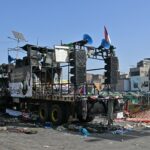
Islamabad, Pakistan – The provincial government of Punjab, Pakistan’s most populous province, is seeking federal approval to ban the far-right religious party Tehreek-e-Labbaik Pakistan (TLP) amid a violent crackdown on the group’s protesters this week.
In a meeting chaired by Maryam Nawaz Sharif, the province’s chief minister and niece of Prime Minister Shehbaz Sharif, officials approved what they described as “historic” and “extraordinary” decisions.
- list 1 of 4‘I don’t feel safe anymore’: Pakistan Christians in fear after mob violence
- list 2 of 4Four Pakistani police killed in violence at far-right TLP protest
- list 3 of 4Pakistan’s blasphemy law: All you need to know
- list 4 of 4Pakistan’s Ahmadis living in fear as graves, religious sites attacked
end of list
The chief minister did not name the TLP, but a statement from her office said the ban would be sought against an “extremist” party, and added that those involved in inciting violence, spreading hatred and violating the law would be arrested “immediately”.
“The extremist party’s leadership will be placed in the Fourth Schedule of the Anti-Terrorism Act,” the provincial government statement said. The Fourth Schedule is a list of proscribed individuals suspected of terrorism and sectarianism under Pakistan’s antiterrorism legislation.
The announcement came four days after a large-scale predawn operation by law enforcement agencies on Monday to dismantle a TLP protest camp in Muridke, 60km (37 miles) from the provincial capital, Lahore.
Muridke made headlines earlier this year in May when India launched missiles on the town, targeting what it claimed were sanctuaries for Pakistan-based armed groups responsible for carrying out attacks on Indian territory.
Following the police operation against the TLP – a political party with a controversial and violent history – authorities said they detained more than 2,700 people, while another 2,800 were placed on an exit control list.
Advertisement
The party has led blasphemy-related protests in Pakistan, a highly sensitive topic in the Muslim-majority country, and has been accused of attacks against religious minorities, particularly Christians and Ahmadis.
Why was the TLP protesting?
United States President Donald Trump unveiled a 20-point plan on September 29, with Israeli Prime Minister Benjamin Netanyahu standing beside him, aimed at ending Israel’s two-year war on Gaza.
The plan, subsequently ratified by several countries, including Pakistan, on October 13, stipulated that the war would end immediately, with all captives held by Hamas in Gaza since October 7 – both alive and dead – returned within 72 hours, and Palestinian prisoners released.
The plan also stated that the Gaza Strip would be temporarily governed by a Palestinian technocratic government with no role for Hamas, and Israel would not annex Gaza. “The United States will work with Arab and international partners to develop a temporary International Stabilization Force (ISF) to immediately deploy in Gaza,” the plan added.
But the plan does not explicitly commit to a Palestinian state, something that is a demand of most of the world – and has been a central part of Pakistan’s policy in the Middle East.
Following Trump’s announcement, the TLP declared its intention to march, stating it did not accept the peace agreement. The party called the peace agreement a “conspiracy to subjugate the Palestinian people” that demanded a protest.
According to the TLP and its chief, Saad Hussain Rizvi, the “Al-Aqsa Gaza March” was scheduled to begin from Lahore, the party’s base, on October 10.
The objective was to march on the main national highway from Lahore towards the capital Islamabad, where the party intended to stage a demonstration outside the US embassy.
“The purpose of this march was to express solidarity with the oppressed people of Palestine and the situation in Gaza only,” a TLP spokesperson who was not present at the protest site told Al Jazeera on condition of anonymity due to fear of arrest.

How did the protest unfold?
As TLP workers gathered in Lahore last Friday, Rizvi addressed a large rally of thousands, urging them to break through all obstacles placed by authorities and carry out their march.
Lahore police had placed numerous containers on the main highway and dug trenches to break the party’s momentum.
However, despite clashes with police, TLP workers managed to break free and reach Muridke by Sunday.
Advertisement
Authorities allege that workers from the party injured several dozen police officials in clashes as they made their way towards Islamabad.
Ehtesham Shami, a local journalist covering the TLP march in Muridke, said party workers arrived in the city despite blockades everywhere that made movement extremely difficult.
Looking at the number of law enforcement personnel present in Muridke and surrounding areas, it was evident that an operation would be launched against the party, and this was even conveyed by authorities to TLP leaders, Shami said.
“However, as workers remained present, around 2am the police started its operation, firing the first tear gas shell,” Shami, who was present at the scene, told Al Jazeera.
He said clashes between the two sides continued for several hours until dawn, during which TLP workers also engaged in counterattacks against police personnel, appearing in “small groups, moving swiftly and acting rapidly”.
The TLP official, one of numerous spokespeople for the party, however, denied any such counterattacks, blaming authorities for “wanton violence against peaceful protesters”, saying the party believes in peaceful protest.
Punjab police said in a statement on Monday that at least one police official was killed in the clashes, while dozens of police personnel were injured, some critically.
Disputed casualty figures
Since the operation ended on Monday, TLP-affiliated social media accounts have claimed the police action resulted in hundreds of deaths among their workers.
While the official government statement said only three TLP workers were killed, the TLP official denied the count.
“Hundreds of our workers were killed, and their bodies were removed from the scene by the officials to hide their crimes,” he claimed, without providing evidence.
The claims have been amplified by several leaders of Pakistan Tehreek-e-Insaf (PTI), the largest opposition party in Pakistan, which itself conducted several operations against the TLP during its tenure between 2018 and 2022.
PTI has faced a state-led crackdown since being ousted from power in April 2022. Last November, at least 12 of their workers were killed in a protest in Islamabad.
Amid the dispute over the death toll in the clashes between law enforcement officials and the TLP in Muridke, Fawad Chaudhry, a former federal information minister under the PTI government, also told Al Jazeera he reached out to several local community leaders and politicians in various cities near Lahore from where TLP workers gathered.
“I spoke to more than two dozen community leaders to find out about any deaths in their constituency following the crackdown on TLP, but apart from one confirmation, nobody else had anything to add,” he said.
What is the TLP?
TLP, a group following the Barelvi school of Sunni Islam, was formed in 2015 by Khadim Hussain Rizvi, the wheelchair-bound father of the current leader. The Barelvi school has roots in Bareilly in India’s northern state of Uttar Pradesh.

The party made its name as a far-right, populist religio-political movement primarily through controversial and violent protests focusing on blasphemy, demanding immediate death for anybody accused of the offence.
Advertisement
The party came to prominence for its vehement support for Mumtaz Qadri, a police constable who shot Punjab Governor Salmaan Taseer in 2011 for expressing sympathetic sentiments towards Aasia Bibi, a Christian woman accused of blasphemy.
The party has continued to mobilise around issues of religious sanctity, with its first major protest taking place in November 2017.
Subsequently, they carried out similar, often violent, protests in 2020 and 2021 over the publication of perceived blasphemous caricatures, during which several police officials were killed.
The TLP contested both the 2018 and 2024 elections. While they never secured a seat in the national assembly, they managed to win more than two million votes in both elections.
In 2018, the party placed fifth in total votes and won three provincial seats from Sindh. In 2024, it ranked fourth in total votes while winning one provincial seat in Punjab.
The party’s founder, Rizvi, died in November 2020 from natural causes at the age of 54. After his death, the party was headed by Saad Hussain Rizvi, who was later joined by his younger brother, Anas Hussain Rizvi.
Blasphemy is an extremely sensitive topic in Muslim-majority Pakistan, with at least 85 people murdered in relation to the allegations since 1990, according to local media and researchers. As of 2023, at least 53 people are in custody across Pakistan on blasphemy charges, according to the US Commission on International Religious Freedom.
The rise of TLP has seen a drastic increase in violence and blasphemy cases filed across the country.
The TLP has particularly targeted Ahmadis, a religious minority in Pakistan that considers itself Muslim but was officially declared “non-Muslim” in 1974 through a constitutional amendment. The party has often targeted their places of worship and desecrated graveyards.
Where are the Rizvi brothers?
Following the police crackdown on Monday morning, the party’s leaders, brothers Saad and Anas, have been missing.

While social media was rife with rumours of at least one brother’s death, with both allegedly having been hit by bullets, Punjab police denied any such reports.
Muhammad Faisal Kamran, a senior Lahore police official, told a news channel on October 14 that neither brother was in police custody, though he added that officials had managed to “trace them” and would arrest them soon.
Shami, the journalist, said that while police deny having custody of both brothers, it appears they will declare their formal arrest within a few days.
“Maybe the purpose of not immediately bringing them forward at this time is to reduce the anger among their supporters and ensure that the situation remains under control, as there is also an impression that if both brothers were arrested and immediately presented, their workers could become agitated,” he told Al Jazeera.
Did the TLP miscalculate?
For a party that has singularly focused on blasphemy-related issues for its brand of “agitational politics”, some analysts say the TLP tried to reorient its approach but miscalculated.
Abdul Basit, a scholar at the International Centre for Political Violence and Terrorism Research at Singapore’s S Rajaratnam School of International Studies, has followed the group closely since its emergence.
The analyst says the party has always believed in confrontational politics, but perhaps with this protest, it tried its hand at other issues.
Advertisement
“Being agitational is part of the TLP DNA, and it tried to move away from blasphemy-related activism,” he told Al Jazeera.
Chaudhry, the former federal minister under the PTI tenure, said there was no public display of any resentment against the Gaza peace deal, making it unclear why the party chose to latch onto this topic.
However, the politician endorsed state action against the far-right party.
“TLP chants slogans of ‘separate the head from the body of a blasphemer’. They set fire on property of people and target minorities. Should they be garlanded for these violent actions? Should politics allow space for parties that endorse beheading people?” Chaudhry asked.
Basit, on the other hand, said every political group or social movement has a “democratic, fundamental right to protest”, regardless of their agenda.
“Now the question is whether the TLP’s protest was peaceful or not. The party does not have any credit due to their tainted past of conducting violent protests. Having said that, there are certainly less violent ways to control a crowd and the state, arguably, used excessive violence,” the scholar said.

Muhammad Amir Rana, a security analyst and director of the Pak Institute of Peace Studies (PIPS), said that the TLP had never previously been held accountable for violence.
“In the past protests, TLP often perpetrated violence against Punjab police personnel, with several police officers dying during different protests. This time, with the state’s full backing, police had the opportunity to go after the party,” Islamabad-based Rana told Al Jazeera.
Did TLP’s Gaza protest fail to resonate with the public?
Public opposition in Pakistan to Trump’s announced Gaza deal has been largely muted, despite criticism and questions about the deal’s practicality.
Pakistan’s mainstream religious parties, Jamaat-e-Islami and Jamiat Ulema Islam-Fazal, held rallies in early October – but they focused on expressing “solidarity for the people of Gaza”, rather than questioning the deal or its conditions.
“Perhaps, TLP felt that their space and political relevance was reducing, so they wanted to hold a protest to get some public attention,” Rana, the security analyst, said.
Basit, the Singapore-based expert, said that while Palestine is also an emotive issue in Pakistan, the TLP’s attempt to galvanise support around the issue had failed.
“No other political or religious group, so far, has publicly protested against the deal or Pakistan’s involvement. Had there been other groups joining their rally, it could have shown there was public sentiment against the deal, serious enough for people to be on the streets, but that was not the case,” he pointed out.
“This shows, clearly, that the party’s protest was solely an effort to mobilise its own supporter base.”
British Caribbean News


